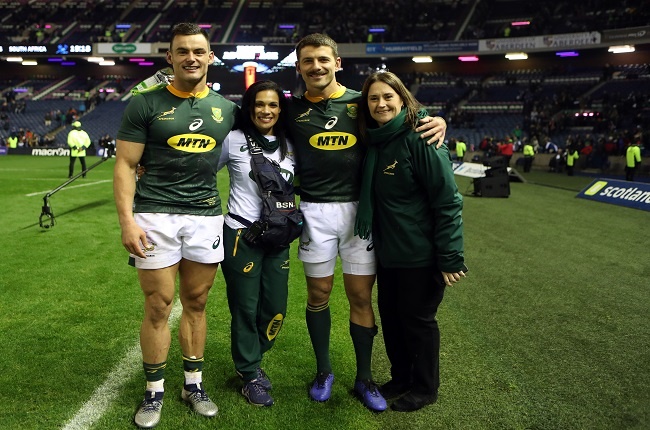


Rene Naylor (L) and Annelee Murray (R) were both part of the Springboks’ team management at the World Cup. (Gallo Images)
- Gender equality was an important if somewhat overlooked factor in the Springboks’ World Cup-winning campaign, believes physiotherapist Rene Naylor.
- She recounted how South Africa caused a stir in Japan by including four women in team management, the most at the tournament.
- Rassie Erasmus’ focus on a team structure with no hierarchy meant that everyone felt empowered, but also focused on not becoming entitled.
The Rugby World Cup-winning Springbok vintage of 2019 gained a lot of admiration for its diversity in general, but there’s one area that’s still overlooked to an extent.
When Rassie Erasmus’ 51-person strong squad arrived in Japan, four members of his team management were women.
It’s a strand of gender equality that Rene Naylor, one of the national team’s physiotherapists, believes contributed greatly to the side’s eventual success.
“We were the team with the most females at the World Cup,” she told a Wits Sport webinar.
“We actually drew quite a bit of attention from (governing body) World Rugby and the local rugby public in Japan. People there were saying ‘Gosh, you actually have females in your team? What are they doing?’.
“It was a very powerful factor.”
While that dynamic was understandably empowering for Naylor and her other colleagues, Tanu Pillay (physio), Annelee Murray (PR manager) and Zeenat Simjee (dietician), Erasmus’ overriding philosophy that there’s no hierarchy within the team’s structure meant that diversity was used as a tool for accountability and not entitlement.
“The biggest principle we applied throughout was avoiding the so-called entitlement trap. It had nothing to with females or males, it was about people. As people progress in their lives, they become a bit entitled and have to catch themselves back up. We spoke about this openly, called each other on it,” said Naylor.
“Rassie shared his own story and told us not to become entitled, rather take ownership and accountability. I’m accountable to myself and my team-mates. If you multiply that with the 51 personalities that were on that journey with us to the final, it becomes quite powerful.”
Shared values and alignment even meant that Naylor and her colleagues gained unexpectedly obvious insights into their actual jobs.
“As a medical team, we had clear guidelines about what we were going to do and what our roles were. There were no egos,” said Naylor.
“We were three physios at the World Cup and we had no ‘leader’. We rotated roles. In fact, we had learnt that in the past – Vivan Verwant and I had worked eight years together before at the Boks – that gosh, we had been doing the same things for eight years.
“I was always responsible for this. My colleague for something else. We should’ve rotated roles earlier so that everyone could learn the different skills. We needed to understand that any person is replaceable.”
The experienced practitioner also reaffirmed the now well-known fact that Erasmus’ replacements – dubbed the ‘Bomb Squad’ in Japan – never felt inferior in terms of importance to the players in the starting XV.
Naylor would know better than anyone else – she was the designated staff member for them.
“The consistent message was that every person that made the 2019 team had a journey to get there. It hadn’t been an easy road, whether you from Strand or Goodwood, Zwide or Bethlehem. We all were warriors in our own right, we fought to get here.
“There was no hierarchy. Everyone felt they had a contribution to make and made an impact. My ‘Bomb Squad’ felt they were part of the team and were important. Starting or being on the bench was always a factor for players previously. In this team, it didn’t matter.”
– Compiled by Heinz Schenk

